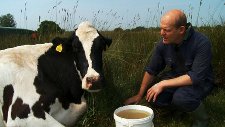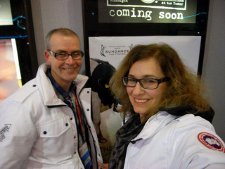 |
| Andy Heathcote and Ida the cow have a conversation as he shoots The Moo Man |
Dairy farmer Steve Hook, his family and his four-legged friends and main source of income are captured through the seasons in Andy Heathcote and Heike Bachelier’s The Moo Man – which will screen at Dunoon Film Festival and Sheffield Doc/Fest in the next week. Hook’s farm became organic in 2000 and began selling unpasteurised milk in 2007 – “literally 23 pints of milk in the back of a Land Rover,” he tells me when I caught up with him, his dad Phil, Heathcote and Bachelier at Sundance Film Festival earlier this year. “Five years later, we're selling all of our milk and we've created six full-time jobs and eight part-time jobs, whereas five years earlier it was a case of doing it or packing up. It's turned the business around,” he says. Heathcote and Bachelier’s absorbing documentary takes a look at the very specific way that Hook does business, carrying about the ‘ladies’ in his herd beyond their fiscal value. Here’s what they told me in conversation.
Amber Wilkinson: How did the project begin?
Andy Heathcote: We are close enough to be on the milk round. He delivers milk in glass with a picture of a cow on it and it creates a fantastic picture and we thought what a wonderful farm, and Heike...
Heike Bachelier: We were both intrigued by the milk bottles, so one day I arranged a surprise visit to the farm for Andy.
AH: It was my birthday.
HB: It had nothing to do with film, really, I just thought it would be a nice thing to do. So we came to the farm and Steve took one or two hours out of his time to show us around and it was fantastic. When we left the farm, we both looked at each other and both knew we had our next film because there were so many issues, as well, and Steve was very open, we thought he would be a fantastic character for the film.

AW: So what did you think when they told you, Steve? Presumably you met them and showed them round with none of this in your mind.
Steve Hook: It was a joy to show them round because dad and I always enjoy showing people around the farm. When they came to dad and me with the proposition... well, we wondered what on earth they wanted to put to us for a start. We wondered what on earth it could be that they wanted to ask us. And when they introduced themselves as being independent filmmakers and wanting to take a chance on producing a 90-minute feature film about us and the farm, we both thought, why not? We've got nothing to hide in the way that we farm and we feel that the dairy farmers' story is a story that should be told. From our point of view it was an opportunity as well, in some ways.
AW: But it must have been a bit odd for you working round the clock, as you seemingly do, with the camera there. Or did you just have certain days when you would be following Steve. How did that work?
AH: We would have quite regular phone chats about what was going on and what things might work, what it was important I was there for. I was visiting two or three times a week, almost every day at some stages. Because he's only 10 or 15 minutes away, if something was happening, Steve could phone and say, 'This cow is going into labour, so if you get here in the next hour, you can catch that.' It took a little while to get a sense of what's important on the farm and what's not, but it was over a long time - three years, so it was an involving process.
AW: Did you ever worry about being on camera or wish that it wasn't there?
SH: I never did, which might sound unusual, but Andy's got such a quiet, unobtrusive way of filming, he would always say, 'Do your stuff, don't worry about me. It's up to me to capture what you're doing not direct it. Pretend I'm not here and behave normally.' So that's what he did. And because he was there for three years... it wasn't just me that got used to Andy being around the place, the cows also got used to him and behaved normally as well.
AW: Presumably, initially, they would have taken quite an interest in the camera and the fact that you were there?

AH: They did in the beginning. The camera's one thing, but for some reason there's an attraction to lick the lens and the furry microphone, the cows love that, they just don't know what it is. And, obviously, because it's the most sensitive part of the camera, you get lots of heavy sniffs in there. But I intentionally work single-shooter because that way there's less impact on the subject - you haven't got this team of people closing in on you. It's much, much easier to be invisible but the only problem is that you get lots of stuff that doesn't work because you haven't got a focus puller and a sound recordist. You've got a much higher wastage rate but you're in there and much more discreet and subtle for things to just happen, it's much easier not to affect the situation, more verite somehow.
AW:How important was it for you from a farming perspective, there has been quite in the news of difficulties of pricing regarding supermarkets and the like?
SH: The situation hasn't really changed. The supermarkets have got a lot of power but maybe this film in some ways might empower farmers to try to market their own milk and secure their own future, especially small family farms. Because they all produce a high quality product but, as you know, supermarkets just use milk as a cheap product. But if people's perception of milk can change when they view this film in that they realise when they buy their pint of milk all the things that have gone on at farm level to get that milk there, if it only achieves that it will have been fantastic.
AW: Were you quite sad when the filming stopped, or were you all just heaving a sigh of relief?
HB: Andy loved being on the farm and shot 150 hours of material. It's a lot of material we needed to get through. But I can understand why Andy loved being on the farm. Still today he says, 'I'll go to the farm and I'll be back in two hours.' I just know he won't. It's always longer because it's very absorbing place.
AW: You say just one sentence in the movie, do you think it's important for directors to stay on the 'right' side of the camera?
AH: I like to be as invisible as possible, from my perspective, the more you can immerse yourself in that story world, the better really. There's two interventions - one's by me and one's by Ida. Ida licks the camera and we had to keep that because it just shows the kind of creature that she is.
AW: What did you think when you first saw it, Steve?
The very first time was just Dad and me, when Andy brought a first cut round and that was quite weird, seeing ourselves. A lot of stuff we'd forgotten about. The next time we saw it was a private showing at a local cinema for family and friends and we had a reception afterwards and that was fantastic.
AW: It must be quite emotional for you, watching yourself be emotional?
It still cuts me up now when I see it.
AW: Does it have a UK distributor yet?
AH:We're still quite keen to do it ourselves for a variety of reasons. The main one is because most of the money comes from DVDs, not the theatrical. And if we're the ones who sell them, the money comes back to us, which is more than we would probably get through a distributor. So we can survive company and most importantly, we're totally independent, so the money from DVDs will pay for us to live and to make our next film. The other important thing is that when a distributor does it, there's a two-week push and then they move on to the next film, whereas we know that this is going to work best if we go to cinemas and talk about it and build a community. And that takes time. There's such a pressure for it all to be over in two weeks. If it takes three or four months, is that really a problem? Personally, I don't think so.
HB: We did it before, released another film into cinemas ourselves and it's actually quite enjoyable doing it this way.
AW: And what’s next for you?
AH: We are keen to do something on raw milk versus the dairy industry. Raw milk faces a similar situation in the US, it's illegal, and in Canada it's illegal. And there's a lot of health properties, knowledge of which is probably a little bit supressed by big business who have a vested interest. So there's a lot of mileage in that, probably.
AW: Will you have a guest role as a 'talking head', Steve?
SH: I might feature in it. Some of the raw milk rules are a bit archaic and we've got a track record of pushing boundaries, so interesting times ahead. The sooner all these issues can come out, the better.





















